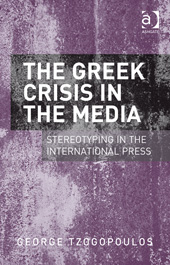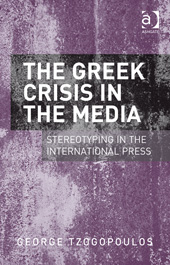 The portrayal of Greece by the international press during the financial crisis has been seen by many independent observers as very harsh. The Greeks have often been blamed for a myriad of international political problems and external economic factors beyond their control. In this original and insightful work Research Fellow of ELIAMEP George Tzogopoulos examines international newspaper coverage of the unfolding economic crisis in Greece. American, British, French, German and Italian broadsheet and tabloid coverage is carefully analysed.
The portrayal of Greece by the international press during the financial crisis has been seen by many independent observers as very harsh. The Greeks have often been blamed for a myriad of international political problems and external economic factors beyond their control. In this original and insightful work Research Fellow of ELIAMEP George Tzogopoulos examines international newspaper coverage of the unfolding economic crisis in Greece. American, British, French, German and Italian broadsheet and tabloid coverage is carefully analysed.
The Greek Crisis in the Media debates and dissects the extent to which the Greek response to the financial crisis has been given fair and balanced coverage by the press and questions how far politics and national stereotypes have played their part in the reporting of events. By placing the Greek experiences and treatment alongside those of other EU members such as Portugal, Ireland, Italy and Spain, Tzogopoulos examines and highlights similarities and differences in the ways in which different countries tackled the challenges they faced during this crucial period and explores how and why the world’s media reported these events.
Reviews
‘Media reporting on the Greek crisis has been often biased and has deepened the rift between Greece and the outside world. George Tzogopoulos offers a sober and courageous analysis of both the Greek crisis and the international media reporting on Greece.’
Hansjörg Brey, Southeast Europe Association, Munich, Germany
‘George Tzogopoulos provides an insightful commentary on what has arguably become the gravest economic crisis to afflict an European Union member state. He does so from the vantage point of being an academic who became a prolific media commentator helping non-Greek journalists to interpret what has been going on inside the country over the last few traumatic years. What Tzogopoulos offers in this books is a comprehensive guide as to how the news media at home and abroad have both portrayed and contributed to the development of this particular story. In doing so he captures the still great uncertainty as to how the political economies of both Greece and the wider EU will recover from what has been the greatest challenge to the integrationist project since its inception after the Second World War.’
Dominic Wring, Loughborough University, UK
‘In these times of crisis, Europe is in desperate need for mutual recognition between its peoples. Instead, old stereotypes and new accusations have surfaced again in its political landscape. Nowhere is this pattern more acute than in the case of the Greek crisis and its perception by outsiders. This book provides a fascinating first account of this story while providing a critical assessment of the claims made in the media. The research is absolutely thorough and the analysis spot on. A must for anyone interested in the fate of the EU and the impact of the financial crisis on its citizen’s collective imagination.’
Kalypso Nicolaidis, University of Oxford, UK
‘George Tzogopoulos’ book is first account to analyse the role of journalists in a crisis threatening the integrity of the eurozone. As an instructive interlocutor for many foreign journalists during these critical years, the author is ideally placed to analyse how the stories coming from Greece were framed for outside audiences.’
Damian Mac Con Uladh, correspondent for The Irish Times, Greece
‘In his book Tzogopoulos nicely explains why the international media focused more on Greece than on other problematic countries of the eurozone in the first years of the crisis. This rich and original work offers a fascinating analysis of the role of journalists from a theoretical and practical perspective and correctly employs the “Greek effect” as a new model in political communication.’
Paul Ronzheimer, Journalist, Bild newspaper, Germany
‘Tzogopoulos’ book offers us a profound and invaluable insight into the role the media have played during the crisis. It helps readers to get a more authentic picture of what is going on in Greece based on the author’s thorough analysis and practical experience of being a regular contributor to international news agencies.’
Gong Ming, Correspondent, China Central TV (CCTV), Greece
‘George Tzogopoulos’s book undoubtedly constitutes a valuable reference manual on the crisis prevailing in Greece. This talented analyst thoroughly explores the impact of austerity on Greek society and also gives an overall view through the eyes of a foreign correspondent. This book enables us to understand how Greece, a pocket-sized country but so rich in history, is the starting point, laboratory and mirror of a new Europe, which has changed very rapidly at the economic and political level, without necessarily leading to the shaping of a union of peoples, ideas and cultures, as envisioned by founder of the EU, Robert Schumann.’
Alexia Kefalas, Journalist, Le Figaro
‘When the crisis in Greece became acute in 2009, it took not only Greek society by surprise but also the foreign media that had neglected Greece in the years before. The coverage that followed was often perceived by Greek society and authorities as being inaccurate and biased. In his new book, George Tzogopoulos analyses the way the Greek crisis was presented in foreign media. A charismatic analyst with the prestigious Greek think tank ELIAMEP, he has been guiding foreign journalists – most of them not familiar with Greek society and language – through the crisis by providing them with much appreciated comments and insight about what is happening in Greece. Besides a profound comparison of how international and Greek media portrayed Greece, the book also includes a balanced summary and interpretation of how the PIIGS states are handling the crisis. Tzogopoulos provides a convincing explanation why the “Greek case” has drawn so much media attention. Thoroughly researched and written in an accessible style this piece is a good read that deserves a wide audience.’
Elena Panagiotidis, journalist, Neue Zürcher Zeitung, Switzerland



